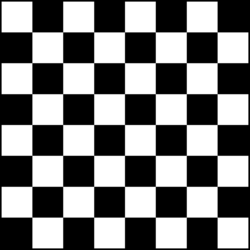64 (number)
| ||||
|---|---|---|---|---|
| Cardinal | sixty-four | |||
| Ordinal | 64th (sixty-fourth) | |||
| Factorization | 26 | |||
| Divisors | 1, 2, 4, 8, 16, 32, 64 | |||
| Greek numeral | ΞΔ´ | |||
| Roman numeral | LXIV | |||
| Binary | 10000002 | |||
| Ternary | 21013 | |||
| Quaternary | 10004 | |||
| Quinary | 2245 | |||
| Senary | 1446 | |||
| Octal | 1008 | |||
| Duodecimal | 5412 | |||
| Hexadecimal | 4016 | |||
| Vigesimal | 3420 | |||
| Base 36 | 1S36 | |||
64 (sixty-four) is the natural number following 63 and preceding 65.
In mathematics
Sixty-four is the square of 8, the cube of 4, and the sixth-power of 2. It is the seventeenth interprime, since it lies midway between the eighteenth and nineteenth prime numbers (61, 67).[1]
The aliquot sum of a power of two (2n) is always one less than the power of two itself, therefore the aliquot sum of 64 is 63, within an aliquot sequence of two composite members (64, 63, 41, 1, 0) that are rooted in the aliquot tree of the thirtenth prime, 41.[2]
64 is:
- the smallest number with exactly seven divisors,
- the first whole number (greater than one) that is both a perfect square, and a perfect cube, and
- the lowest positive power of two that is not adjacent to either a Mersenne prime or a Fermat prime.
64 is the fourth superperfect number — a number such that σ(σ(n)) = 2n.[3]
64 is the sum of Euler's totient function for the first fourteen integers.[4]
The number of graphs on four labeled nodes is 64.[5]
It is also the fourth dodecagonal number,[6] and seventh centered triangular number.[7]
Since it is possible to find sequences of 65 consecutive integers (intervals of length 64) such that each inner member shares a factor with either the first or the last member, 64 is the seventh Erdős–Woods number.[8]
In decimal, no integer added to the sum of its own digits yields 64; hence, 64 is the tenth self number.[9]
64 is the index of Graham's number in the rapidly growing sequence 3↑↑↑↑3, 3 ↑3↑↑↑↑3 3, …
In the fourth dimension, there are 64 uniform polychora aside from two infinite families of duoprisms and antiprismatic prisms, and 64 Bravais lattices.[10]
In science
64 is:
- the atomic number of gadolinium, a lanthanide.
- number of codons in the RNA codon table of the genetic code.
In computing
64 is the size in bits of certain data types in some computer programming languages, where a 64-bit integer can represent values up to 264 = 18,446,744,073,709,551,616.
- Base 64 is used in Base64 encoding, and other data compression formats.
In other fields
64 is also:
- the number of squares in a regular eight by eight chessboard.
- the number of hexagrams in the I Ching (that is also the maximum number of strokes in any Chinese character).
See also
References
- ↑ Sloane, N. J. A., ed. "Sequence A024675 (Average of two consecutive odd primes.)". OEIS Foundation. https://oeis.org/A024675. Retrieved 2023-11-06.
- ↑ Sloane, N. J. A., ed. "Aliquot sequences". The OEIS Foundation. https://oeis.org/wiki/Aliquot_sequences.
- ↑ "Sloane's A019279 : Superperfect numbers". OEIS Foundation. https://oeis.org/A019279.
- ↑ Sloane, N. J. A., ed. "Sequence A002088 (Sum of totient function: a(n) is Sum_{k equal to 1..n} phi(k), cf. A000010.)". OEIS Foundation. https://oeis.org/A002088. Retrieved 2023-11-06.
- ↑ Sloane, N. J. A., ed. "Sequence A006125 (a(n) equal to 2^(n*(n-1)/2).)". OEIS Foundation. https://oeis.org/A006125. Retrieved 2024-01-16.
- ↑ "Sloane's A051624 : 12-gonal (or dodecagonal) numbers". OEIS Foundation. https://oeis.org/A051624.
- ↑ "Sloane's A005448 : Centered triangular numbers". OEIS Foundation. https://oeis.org/A005448.
- ↑ "Sloane's A059756 : Erdős-Woods numbers". OEIS Foundation. https://oeis.org/A059756.
- ↑ "Sloane's A003052 : Self numbers". OEIS Foundation. https://oeis.org/A003052.
- ↑ Brown, Harold; Bülow, Rolf; Neubüser, Joachim; Wondratschek, Hans; Zassenhaus, Hans (1978), Crystallographic groups of four-dimensional space, New York: Wiley-Interscience [John Wiley & Sons], ISBN 978-0-471-03095-9
 |


